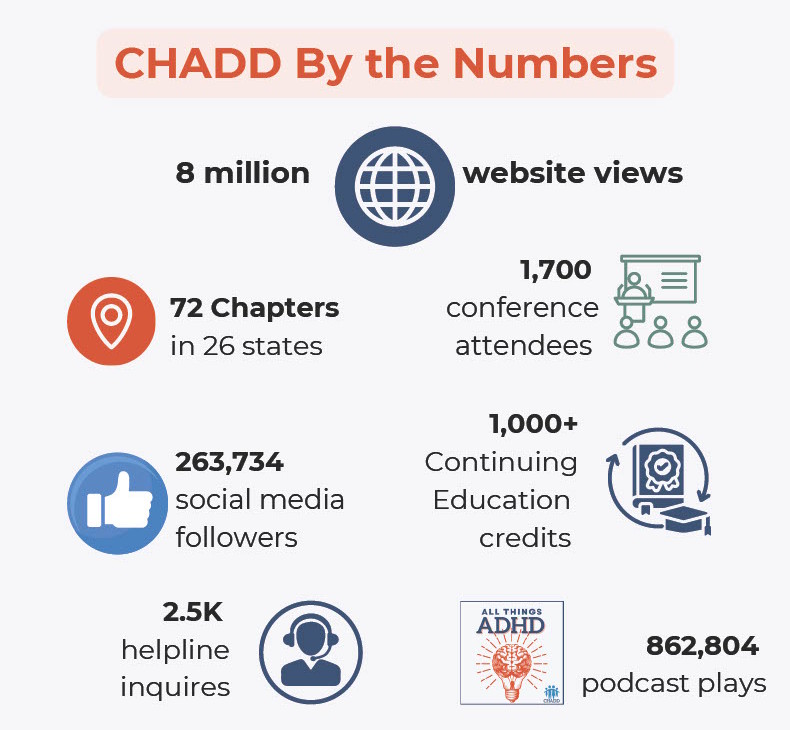Mission, Vision, and Values
Mission: To empower all people affected by ADHD through evidence-based resources and education, unparalleled support, community connections, and steadfast advocacy.
Vision: A world that recognizes, incorporates, and celebrates all people with ADHD.
Values:
- Integrity, Respect, and Compassion
- A Supportive and Welcoming Community
- Growth, Collaboration, and Innovation
CHADD is dedicated to creating a diverse, equitable, and inclusive environment for our employees, volunteers, and community.
CHADD's full statement on Diversity, Equity, Inclusion, and Belonging (DEI&B) »

“If you have a challenge, or someone in your family does, don’t get discouraged. There’s always a way to reach your dreams—it just might not be the path everyone else takes.”
Peyton Barber
GOALS & PRIORITIES
Our History
CHADD (Children and Adults with Attention-Deficit/Hyperactivity Disorder) was founded in 1987 by a group of parents looking for community and support for their children with ADHD. At that time, it was difficult to find information about ADHD, and it was a challenge to connect with others living with or parenting a child with ADHD. ADHD research and strategies were slim, clinicians and educators knew little about the disability, and individuals with ADHD were often mistakenly labeled behavior problems.
Today, CHADD is the leading nonprofit supporting the more than 22 million American children and adults with ADHD across every zip code, income bracket, and stage of life. We help facilitate 72 chapters and support groups in 26 states, and, along with our partners at the Centers for Disease Control and Professional Advisory Board of nationally recognized ADHD experts, produce evidence-based resources about ADHD at no cost through the National Resource Center on ADHD. CHADD’s three pillars of work are providing research-based ADHD resources, facilitating support and community, and championing the advocacy needs of people affected by ADHD.
CHADD’s staff work closely with our Board of Directors and more than fifty professionals serving on ten committees, as well as dedicated volunteers from around the country who provide support and education to parents, educators, and professionals on a grassroots level. Along with its growth in membership and reputation over the years, CHADD has retained the passion and commitment of its founders, always centering the lived experience of people affected by ADHD in the work we do.
Staff, Boards & Committees
CHADD is fortunate to have a capable, caring and highly professional staff. From the mailroom to the boardroom to the CEO’s office, CHADD employees have one thing in common: They all work hard and contribute their talents to make the world a better place for people living with ADHD. They work tirelessly every day to educate the public, policymakers, members of the media, parents and educators about the disorder. The secrets to CHADD’s success: Experience, Talent and Diversity. CHADD attracts the best and the brightest and the most seasoned professionals from all over the country and actively seeks to promote diversity within its ranks. This stellar list of employees enables the organization to make a difference for millions of people affected by ADHD and their families.
The National Resource Center
The National Resource Center on ADHD (NRC), a program of CHADD, was established to be the national clearinghouse for the latest evidence-based information on ADHD. It is primarily funded through a cooperative agreement with the Centers for Disease Control and Prevention (CDC) National Center on Birth Defects and Developmental Disabilities (NCBDDD). The NRC serves as a National Public Health Practice and Resource Center (NPHPRC) with the mission to provide information, education and consultation about assessment, diagnosis, treatment, and issues of health and well-being for children with ADHD and their families.
